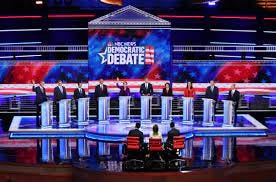The Democratic National Committee (DNC) proclaimed in April that there will be no debates before the Democratic presidential primaries, which start in February, 2024.
But there have been calls from presidential candidates as well as Democratic voters —and petitions—for incumbent President Joe Biden to participate in primary debates.
A petition started by “Debates Equal Democracy” has collected almost 26,000 signatures. American Values 2024 also started a petition, here.
Polls confirm growing ire against the DNC and the wider democratic establishment for throwing support behind Biden in what some critics view as an un-democratic system rigged against challengers like Robert F. Kennedy, Jr.
USA Today/Suffolk University survey found that eight in 10 Democratic primary voters want Biden to debate. This includes 72 percent of those supporting Biden. The survey was conducted from July 5 to 9.
“The decision not to debate is ignoring the 82% of women, 84% of union households, 86% of independents, and 90% of young voters who are not only planning to vote in their state's Democratic primary or caucus next year but also would like to see a series of Democratic primary debates,” said David Paleologos, director of Suffolk's Political Research Center, along with the results according to USA Today.
Kennedy has called DNC’s decision “unfortunate.” As has Marianne Williamson, the third Democratic presidential candidate, who has accused the DNC of "rigging" the contest against her.
”Biden officials and their minions have used mainstream news platforms to spread the word far and wide,” Williamson writes in her Newsweek op-ed titled, ‘Debate Us, Mr. President.’ “There will be no debates, nor any further discussion about it. Candidates other than the chosen one anointed by the DNC should take their toys and go home now.”
However, there’s nothing unprecedented about the decision to anoint Biden the nominee. Neither Trump nor Obama participated in primary debates. In fact, no incumbent president has participated in a primary debate since 1948.
“There's precedent for not having debates even when there is a credible primary challenger, like in 1980, with Jimmy Carter,” says Aaron Good, a political scientist and author of American Exception: Empire and the Deep State.
The end of Carter’s presidency was marred by the Iran hostage crisis and the energy crisis. Carter sought re-election and ended up losing to Ronald Reagan. Carter didn't debate Massachusetts Senator Ted Kennedy, even though he was unpopular compared to other incumbent presidents.
Carter is a good example of what might happen when an unpopular candidate runs for re-election.
Democrats not having debates is not at all surprising. However, given Biden’s unpopularity, the strategy might backfire: he is in a historically weak position as an incumbent.
“I think they're actually doomed,” said Good. “If they nominate Biden, I think Cornel West will get more votes than any third party has in a long time. And Trump, Trump will likely beat Biden unless they throw Trump in jail.
The Democratic Party establishment doesn’t want Kennedy to run at all. They’ve moved from ignoring him to attacking him, increasingly viciously.
Meanwhile, the media has its knives out.“I have never seen anything like it,” Good says. “Whenever he comes on, it's like they're obligated to spit when they say his name.”
The Democratic Party has a history of smear campaigns. The DNC reportedly mocked Senator Bernie Sanders’ presidential campaign in 2016. In addition, in 2019 a closed-door meeting with wealthy, liberal donors was held in San Francisco. The agenda of the meeting was: “How to get rid of Bernie?” The Democrats were worried that Sanders would complicate their effort to beat President Trump.
“What they're doing to RFK Jr. is even worse than Bernie,” says Good. “At least they had a rigged primary process for Bernie because, I guess, they couldn't avoid it. But they didn't insult Bernie with slurs every time they talked about him.”
Good thinks that the smearing is bigger than the media or the Democratic Party. It all starts from high above—from “the richest people in the United States, who depend on this corrupted two-party system.”
Kennedy’s candidacy presents a challenge to the Democratic Party’s ruling elite. But Good believes that media censorship and the establishment’s actions against Kennedy will eventually cost the party.
“We're going to see that it backfires,” Good says. People realize the media and the political system are so corrupt that if they're saying all these bad things about this person, he must be good.”





The Democratic party no longer believes in democracy. They are a private corporation that can make its own rules and then later choose to violate them. They reserve the right to choose their candidate in a smoke filled back room. Debates complicate the situation, especially when their preferred nominee probably is incapable of debating on a stage at this point.
RFK jr needs to consider his own independent run if the DNC continues to rig the primaries